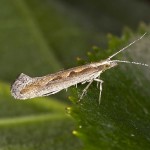JBS, the world's largest beef producer, was sued on Wednesday by New York state's attorney general, which accused it of misleading the public about its impact on the environment in order to boost sales.


Attorney general calls company's emissions goals 'infeasible'

International meat packer hopes for access to lower-cost capital

Company blocked from advertising product as non-toxic

Backyard flock with 'increased mortality' also being tested; cases now also in four U.S. border states




Genetically engineered male moths prevent females from reproducing